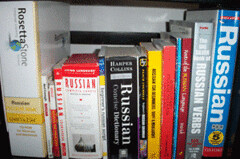Although I have not posted any new content to this site in over six month, I am still getting hits, comments, and emails. I think it means that it is time for me to begin posting again.
As I told you earlier, I did deviate into some Greek lessons. I found that they were much easier than Russian, but I was much less enthusiastic about learning Greek. There is a local Greek restaurant near my office that I visit about once a week. After I discovered that the owner was actually Iranian, I had even less motivation to keep up with my Greek lessons.
So I am back to Russian... and a little Italian on the side.
I figure that I need to start the Pimsleur lessons again, from scratch, as a review. I only have the level 1 lessons on cassette... my only cassette player is in my bedroom, so I end up being "confined" to the bedroom to do these lessons instead of listening to them on my iPod as I go about my daily business. Oh well, if I can make it through the 30 days of lessons, then I can move on to my level 2 CDs.
Also, I will clean up my side frames on this blog and perhaps revise my template if I am feeling creative. Any suggestions?
tag(s): Pimsleur Rosetta Stone Russian



